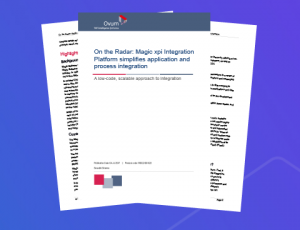Why Flexibility in Cloud Services is Key to ERP Success in Todays Age

In the fast-moving digital world, being able to quickly adapt to disruptive business processes and changing business needs is key to success and survival.
While organisations might be able to adapt their strategy and culture, they also need their business systems to adapt to these new processes and requirements. The need for flexibility and near real-time response to changing business processes is especially essential for an organisation’s core ERP system.
Here are five reason why ERP needs to be Flexible:
1. Hybrid Cloud Configurations
Today companies should be prepared to extend their core ERP systems with a variety of cloud-based services to take advantage of best-of-breed and supplemental capabilities. They also may want to support a two-tier ERP model in which companies run more than one ERP system, often a primary one at headquarters and additional cloud ERP services at subsidiaries. Companies should have the flexibility to create efficient, seamless workflows across multiple ERP systems, add-on services, and different applications, including CRM, WMS, and PLM – regardless of whether they reside on-premises or in the cloud.
2. Changing Business Models
Companies shouldn’t have to limit the way products and services are offered because their under pinning system is inflexible. For example, with the growing demand for subscription services, insurance companies are providing insurance coverage for young drivers by the day and jet engine manufactures are sell air time instead of the engines themselves. An inflexible ERP system that can’t support dynamic business practices such as new revenue models and depreciation methods can be a serious inhibitor to positive changes. No company wants to be limited to outdated business models because of its ERP system.
3. Mobile ERP
The ability to perform day-to-day business functions on the go, including approving purchase requests, signing contracts, and viewing inventory levels boosts efficiency considerably. Mobile ERP applications benefit everyone from sales people to warehouse workers to CEOs who want immediate access to financial reports. Enterprises must be prepared to mobilize relevant ERP data and processes, update data based on real-time transactions and support offline use cases.
4. Secure ERP Data
Weak ERP security can lead to a loss of assets and compromise data privacy. Securing ERP data also needs to take into account the possibility of integrating with public clouds and tools. In order for sensitive data to be protected, ERP systems need consistent secure integrations to back end and reporting systems.
5. IOT Data Tsunami
Companies wanting to leverage data from IoT systems for predictive maintenance, predictive analytics, and optimized manufacturing, could be flooded with huge volumes of data coming from sensors. ERP systems can connect the device data with business data and must be able to process, analyse and show all this data in real-time. Elasticity with the ability to scale up quickly will become essential as more and more ERP business processes are data driven.






